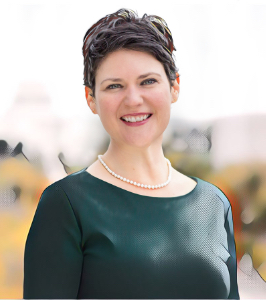Our work to do

Trauma and transformation are two words that come to mind as I think of 2020 thus far.
As I write, nearly 150,000 Americans have died from COVID-19, and more than 4 million Americans have tested positive for the coronavirus. Those serving on the front lines of the response to this crisis have done so at times without needed protective gear and have endured enormous trauma that will affect them for years to come. The coronavirus will continue to disrupt our daily routines for the foreseeable future as we do our best to control the loss of human life. Our consumer-driven economy is collapsing, and millions of Americans are unemployed. People of color have borne the brunt of the pandemic and its myriad impacts.
This summer has been a season of unrest and protest, triggered by horrific murders, including that of George Floyd at the hands of one Minneapolis police officer as three of his colleagues were in a position to intervene and did nothing to stop it.
Yet we know that the trauma, pain and grief we are seeing in the demonstrations for racial justice across the United States and in cities around the world are about much more. It’s not just a reaction to the latest example of police brutality against an unarmed Black man or woman. It’s about 401 years of oppression on these shores, about centuries of murder, rape, enslavement, dehumanization, redlining, racist hiring practices, educational inequalities, unjust distribution of resources and more wrongs that continue to this day.
This season of reckoning is both inevitable and necessary. As painful and shameful as it is to admit, it takes dramatic demonstrations in American cities to get our collective attention, or more precisely, the attention of white America. Our brothers and sisters tried to get our attention with numerous peaceful protests, such as taking a knee during the singing of the national anthem or reminding us that #BlackLivesMatter. Nothing changed, and indeed, those who protested faced an intense backlash from the privileged majority.
What is our work to do? It’s a personal question that I believe every white person in this country needs to be asking herself right now. For me, it starts with understanding the roots of racism and implicit bias. Candid books like How to Be an Antiracist by Ibram X. Kendi challenge us to interrogate assumptions that in other times might be unquestionable. Learning also demands listening to the experiences of others. I’m trying hard to listen with all my senses to the pain of my Black brothers and sisters.
I’m a self-described freedom-loving Baptist, so one particular story got my attention. Kendi tells about his father’s conversation with theologian James Cone in 1971, in which he asked Cone for his definition of a Christian. Cone responded, “A Christian is one who is striving for liberation.” Kendi remarked, “James Cone’s working definition of a Christian described a Christianity of the enslaved, not the Christianity of the slaveholders.”
You can read more on pages 8-11 (of the summer 2020 magazine) about a national conversation on white supremacy and American Christianity that BJC hosted in June. That discussion goes to the heart of this work to reconstruct a theology that is on the side of the enslaved, the disenfranchised, the powerless — one that is closer to the theology of Jesus than what we see largely evidenced in American Christianity right now.
I write, of course, not only as an individual white Christian, but as the leader of BJC. What is BJC’s work to do right now? Last September, the BJC Board of Directors appointed a Special Committee on Race and Religious Liberty to study BJC’s past. From our beginnings more than 80 years ago, BJC has been a group of white and Black Baptist denominations committed to protecting religious freedom. But how welcome were those Black Baptists at the BJC Board’s table, and how well did we white Baptists listen to their concerns for freedom when they most could have used the power of BJC’s privileged allyship and advocacy? Our committee is studying those difficult and uncomfortable questions now and will report to the Board later this year with recommended actions for reparation.
We cannot just study the past and not act in the present. I hope you will join us in the BJC-led Christians Against Christian Nationalism initiative as we bring awareness to the ways that Christian nationalism often overlaps with and provides cover for white supremacy and racial subjugation.
I pray that through our shared learning and work, the pain and trauma of this difficult year may bring rebirth, transformation and freedom for all.
Amanda Tyler is executive director of BJC.
This column appeared in the summer 2020 edition of Report from the Capital. You can read the entire magazine as a PDF or a digital flip-through edition.




